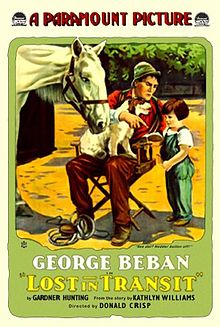Lost in Transit (1917 film): Difference between revisions
added commons category |
|||
| Line 54: | Line 54: | ||
[[Category:American drama films]] |
[[Category:American drama films]] |
||
[[Category:Lost American films]] |
[[Category:Lost American films]] |
||
[[Category: |
[[Category:1917 drama films]] |
||
[[Category:Paramount Pictures films]] |
[[Category:Paramount Pictures films]] |
||
[[Category:Films directed by Donald Crisp]] |
[[Category:Films directed by Donald Crisp]] |
||
[[Category:American black-and-white films]] |
[[Category:American black-and-white films]] |
||
[[Category:American silent feature films]] |
[[Category:American silent feature films]] |
||
[[Category:1917 lost films]] |
|||
[[Category:Lost drama films]] |
|||
{{1910s-drama-film-stub}} |
{{1910s-drama-film-stub}} |
||
Revision as of 10:16, 21 April 2020
| Lost in Transit | |
|---|---|
 Theatrical release poster | |
| Directed by | Donald Crisp |
| Screenplay by | Gardner Hunting Kathlyn Williams |
| Produced by | Julia Crawford Ivers |
| Starring | George Beban Helen Jerome Eddy Pietro Sosso Vera Lewis Henry A. Barrows Frank Bennett |
| Cinematography | Faxon M. Dean |
Production company | Pallas Pictures |
| Distributed by | Paramount Pictures |
Release date |
|
Running time | 50 minutes |
| Country | United States |
| Language | Silent (English intertitles) |

Lost in Transit is a lost[1] 1917 American silent drama film directed by Donald Crisp and written by Gardner Hunting and Kathlyn Williams. The film stars George Beban, Helen Jerome Eddy, Pietro Sosso, Vera Lewis, Henry A. Barrows, and Frank Bennett. The film was released on September 3, 1917, by Paramount Pictures.[2][3]
Plot
As described in a film magazine,[4] upon the death of his wife during the birth of his son, the wealthy Mr. Kendall (Barrows) places the child in a home and expresses a desire never to see his baby again. After two and one-half years of loneliness, however, he sends for the youngster. On the way home, the child is kidnapped from the carriage and the father and servants are mystified. In the meantime, Niccolo (Beban), an Italian junkman, finds a youngster among the rags of his cart and takes him home, intending on the following day to turn the child over to the police. He becomes attached to the little fellow and puts off going to the authorities. Another Italian, hearing of the Kendall reward, discloses that Niccolo has a baby concealed in his home and they take the child away upon the testimony of a grafting nurse. The death of a pickpocket, however, clears up the disappearance of the Kendall baby and the real Kendall heir is returned to his father, while Niccolo is allowed by a kindly judge to retain possession of his new ward.
Cast
- George Beban as Niccolo Darini
- Helen Jerome Eddy as Nita Lapi
- Pietro Sosso as Lapi
- Vera Lewis as Mrs. Flint
- Henry A. Barrows as Mr. Kendall
- Frank Bennett as Paolo Marso
- Robert White as Baby
Reception
Like many American films of the time, Lost in Transit was subject to cuts by city and state film censorship boards. The Chicago Board of Censors required a cut of the shooting in a vision scene.[5]
References
- ^ The Library of Congress/FIAF American Silent Feature Film Survival Catalog:Lost in Transit
- ^ "Lost in Transit". AFI. Retrieved 4 January 2015.
- ^ "Lost in Transit (1917) - Overview - TCM.com". Turner Classic Movies. Retrieved 4 January 2015.
- ^ "Reviews: Lost in Transit". Exhibitors Herald. 5 (12). New York: Exhibitors Herald Company: 23. September 15, 1917.
- ^ "Official Cut-Outs by the Chicago Board of Censors". Exhibitors Herald. 5 (16): 33. October 13, 1917.
